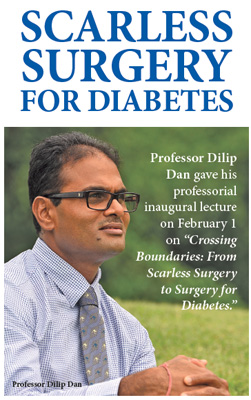 |
 |
 |
|
February 2018
|
Another major boundary crossed is in the treatment of Type 2 diabetes, a lifestyle disorder associated with weight gain and poor eating habits leading to insulin resistance and abnormally high levels of sugar in the blood. It is managed by diet, exercise and medications, including insulin, if not well controlled. When obese diabetics underwent weight loss surgery, it was found that their diabetes resolved within days of surgery, long before any weight loss occurred. Research has shown that this results from significant hormonal and metabolic changes within the gastrointestinal tract. This has led to so-called “Metabolic Surgery” which is surgery aimed at reversing metabolic disorders, especially diabetes. Conventional surgery removes or fixes a defective organ or structure. With diabetes, surgery is used to treat a lifestyle disorder by altering a normal organ or structure. A true paradigm shift. Professor Dilip Dan joined the University of the West Indies, St Augustine Campus as a Lecturer in General Surgery in 2004. His Professorship was awarded in 2015 at which time he was made Head of the Department of Clinical Surgical Sciences, University if the West Indies. He is a Caribbean pioneer in laparoscopic and Bariatric surgery and his research area reflects this. Professor Dan’s accomplishments as a surgeon and his continued contribution to the surgical field in the region through education and training are the basis for his advancement. His contributions to the field of Surgery in Trinidad and Tobago was nationally recognized in August 2015 when he received a national award – the Hummingbird Medal Gold – for his work in the public sector. He is the Chairman and President of the Caribbean Obesity Society (COS), President of the T&T Chapter of the American College of Surgeons (ACSTT) and the Vice President of the Caribbean Association of Endoscopic Surgeons (CaSES). He also served as President of the Society of Surgeons of T&T (SOSTT) and is an executive member of the Caribbean College of Surgeons and the John Sabga Pancreatic Cancer Foundation. In addition, he is the Caribbean coordinator for the Curaçao Laparoscopic Workshop (CLW). He has recently been appointed University Examiner by The UWI for Surgery. |

 The practice of surgery has evolved with dramatic transformations in the way procedures are performed. This evolution has been largely patient outcome driven and facilitated by technological advances. In years gone by, surgery required large incisions for maximum exposure and easier removal of affected structures. The downside was high patient morbidity and mortality, as patient stress responses and complications were highly dependent on the incisions. Towards the end of the 20th century minimally invasive surgery came into vogue as it demonstrated that surgery could be performed with smaller incisions and better outcomes for the patient. Indeed, it was because of technological advances that video directed (laparoscopic) surgery became a reality and allowed major operations to be performed with very small incisions. Patients have been the major beneficiaries as these procedures are associated with more rapid recovery, less pain, better cosmetic outcomes and faster return to productive work. Over the last 25 years we have witnessed exponential advancements to a point where surgeries (including weight loss surgery) can now be performed with no visible scars.
The practice of surgery has evolved with dramatic transformations in the way procedures are performed. This evolution has been largely patient outcome driven and facilitated by technological advances. In years gone by, surgery required large incisions for maximum exposure and easier removal of affected structures. The downside was high patient morbidity and mortality, as patient stress responses and complications were highly dependent on the incisions. Towards the end of the 20th century minimally invasive surgery came into vogue as it demonstrated that surgery could be performed with smaller incisions and better outcomes for the patient. Indeed, it was because of technological advances that video directed (laparoscopic) surgery became a reality and allowed major operations to be performed with very small incisions. Patients have been the major beneficiaries as these procedures are associated with more rapid recovery, less pain, better cosmetic outcomes and faster return to productive work. Over the last 25 years we have witnessed exponential advancements to a point where surgeries (including weight loss surgery) can now be performed with no visible scars.